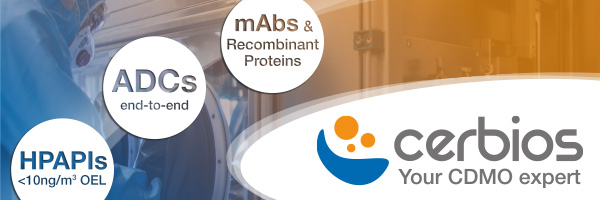Contract Services
Managing Asian Supply Chains 9th September 2019
By Dr Stephen Houldsworth, Vice President, Global Head of Platform Management & Marketing at CordenPharma International
Dr Stephen Houldsworth, Vice President, Global Head of Platform Management & Marketing at CordenPharma International, discusse
Dr Stephen Houldsworth, Vice President, Global Head of Platform Management & Marketing at CordenPharma International, discusses current challenges with global supply chains in this insightful interview.

Considering the recent news items related to carcinogenic impurities in various Sartan’s from Asian sources, what has been your company’s response as an API supplier given the discovery that perhaps synthetic chemistry issues were not taken into account sufficiently when processes were changed?
That’s a very relevant question and one that CordenPharma takes very seriously. We continue to see the effects of this recent “Sartan” scandal ripple through the industry as the investigation now widens to other families of molecules that potentially could also have similar challenges.
I have not seen any updates from the FDA recently around exactly what happened in this particular situation, but it appears that a seemingly trivial process solvent change was at the heart of the problem, which was then further impacted by poor impurity profile monitoring and ultimately data integrity issues.
What is unclear at this time is whether the process change was adequately investigated at the initiation of the change, and that appropriate controls were put in place and ignored, or whether the change was just simply not fully assessed at the start. I hope that ultimately the FDA releases more information on this situation, because the industry needs to learn from these mistakes and obviously improve.
With specific respect to CordenPharma in this situation, at this stage we are not changing anything or introducing any new procedures at our facilities, as we believe we already have a very robust change control process. We understand that when it comes to our customers’ APIs, we are the scientific experts with the most knowledge about the process. It is our responsibility to therefore appropriately assess proposed changes via a robust change control process and advise our customers about what precautions need to be taken and which studies may need to be completed before process changes are implemented.
As a CDMO however, this can often put us in a difficult position, as some customers may not fully understand the potential risks or may not want to delay changes while the appropriate studies are completed. What unfortunately complicates the situation further is the matter of costs.
Any proposed changes to the process are communicated in advance to our customers, including full involvement of appropriate approvals. Their level of involvement can obviously change depending upon the scientific depth and bandwidth of the customer, but generally we like and encourage our customers to be as involved as possible.
The challenge comes if the enforced changes, which sometimes occur absolutely outside of our control, incur un-budgeted costs for our customers. Whenever possible, we obviously work with them on these issues. However, we have an obligation to the end users – the patients – to ensure this work is completed, and that we are ultimately producing safe products for the market place.
Having said that, we need to strike a balance. At CordenPharma, we supply APIs to customers in all stages of development, from early Phase I supplies through to commercial supply of approved drugs in the market place. Our approach needs to take into consideration the phase of the product and the intended use so that we can tailor phase-appropriate solutions.
As expected, we often experience pressure to keep costs down by using Asian sources for raw materials. In fact, as a CDMO we are almost always in a competitive bid situation and being compared to our CDMO peers, who are also using Asian sources, so it is difficult for us to do anything else – we ultimately need to be competitive in the marketplace to survive.
The use of Asian sources in the early phase of development can obviously offer significant cost savings to our customers, but as we move through the development phases, this approach can sometimes seem “penny wise & pound foolish” when challenges start to manifest themselves.
Challenges with Asian raw material sources include:
- Sudden process changes leading to quality issues
- Changes in manufacturing sites or sudden plant closures
- Finding out that who you thought was the manufacturer turns out to be an agent all along
These sorts of unexpected variables always show up at the most inopportune times, and can lead to very impactful situations such as requiring the qualification of new sources, repeating of process validation batches, reconsidering fate and purge studies, all of which can impact submission timelines, ultimately delaying regulatory approvals and adding extra costs not planned for in the original budgets. These are the factors that pharma customers are often not considering when they initially insist on the use of cheaper Asian sources for raw materials or resist proposals to introduce alternative sources through the development cycle.
When discussing Asian supply chains, how does CordenPharma address these concerns?
Obviously, we need to be competitive in the marketplace, so we have to consider using Asian raw material suppliers for those initial early-phase manufacturing runs. However, wherever possible we will use vendors that we are familiar with and have used before – that would be our ideal situation – but clearly that is not always possible.
As our customers successfully move further along the clinical process, we encourage them to introduce multiple sources of raw materials so we can build contingency into the supply chain. We also start to increase the Quality & Compliance oversight of these suppliers by conducting on-site audits of these vendors, especially as we approach Phase III supplies and process validation activities. But all of these approaches require time and money – two scarce resources that our customers often limit or have not planned for in their timelines and budgets.
As a case in point, we are helping to navigate one customer’s project through a difficult situation. Their CMC & Clinical team had submitted a timeline and budget to their upper management which didn’t correspond to our estimates of timeframe or project costs. Now both groups are scrambling to get things done on time within the limits of their budgets.
The takeaway here for pharma & biotech customers is that instead of just considering your CDMO within the confines of a contractual relationship, invite them into your planning stages, seek their input, and strategize together as trusted partners on how to achieve your goals. We have seen this process save significant time and money for our customers down the road.
Perhaps CordenPharma’s biggest differentiator on the topic of Asian supply chains is our sister company Weylchem. CordenPharma and Weylchem are both owned by the International Chemical Investors Group (ICIG), which was founded in 2006 with the vision of building a privately-owned global industrial conglomerate covering non-GMP chemical production (WeylChem), and chemical pharmaceutical cGMP manufacturing services (among other businesses), the latter being formed into the CordenPharma umbrella platform. Through this non-GMP manufacturing network, we produce some of the more complex regulatory starting materials that, when otherwise sourced from Asia, often lead to major challenges.
The advantages of accessing the Weylchem group are that they operate under Western standards for quality, environmental controls, safety, business ethics and confidentiality, and since CordenPharma and Weylchem both have sites located in Europe and the US, the logistics and delivery of raw materials are greatly simplified.
Furthermore, because we have greater visibility and insight into the operations at Weylchem, we can be assured that there are no surprise process changes or site modifications at the last minute that would cause a delay in filing. Also, it is very easy to share analytical methods within our transparent network – so the chance that a lot of raw material is going to show up at one of our facilities that fails specifications, and thus delays a production run, is non-existent.
How does price factor into these decisions?
Although manufacturing raw materials in a European setting is more expensive than purchasing from an Asian source, what is the cost associated with a delay to an approval or day 1 launch due to a submission deficiency which is related to a regulatory starting material?
These costs are harder to visualize for our customers and, unless they have experienced them in the past, are more easily trivialized or minimized. However, they do happen – more often than you would think.
Today the CDMO industry is being constantly pressured to delay what might be considered unnecessary expenses as customers scramble with inadequate budgets to complete the earlier clinical milestones. However, the drug developers need to understand they are often just putting off the inevitable situation – sometimes paying a slightly higher price upfront can save significantly down the road in terms of time and money.
These issues can be addressed or mitigated at an earlier stage by paying closer attention to the full supply chain, and by perhaps spending a little more on the overall API budget to secure raw materials from a Western source, especially when considering some of the more complex regulatory starting materials and their possible challenges if comparatively sourced from Asian suppliers.
Formed as the global pharmaceutical service and manufacturing platform of International Chemical Investors Group in 2006, CordenPharma is a full-service partner in the Contract Development & Manufacturing (CDMO) of APIs, Drug Products, and associated Packaging Services.



